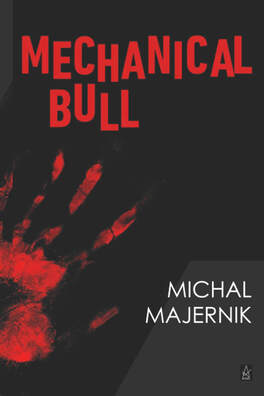|
Fans of stylistically-rich literary fiction have only to read the first few pages of Michal Majernik’s novel, Mechanical Bull, to realize they have just discovered a rare kind of talent. It is one sharply aware of the soul-suffocating urban environments in which 21st century humans have encased themselves, and equally cognizant of the psychological dilemmas caused by their pursuits of illusory security and something resembling genuine love. The question after realizing the rarity of Majernik’s gifts (a relative newcomer to literary fiction, at least for this reader) becomes: what is he going to do with them for the rest of this book? And how might he utilize them in future works? For now, it’s worth noting that previous efforts as represented by his short story collection Alibist, and work as a journalist reporting on businesses in Canada, are put to advantageous use. Occasional typo malfunctions in the current work raise some concerns but, fortunately, do not diminish the strength of the story itself. Lava and Tears Mechanical Bull (Adelaide Books, 2021) is a novel driven by the mercurial force of its three main characters’ often unpredictable, and at times violent, personalities. Each stars in their own chapter. We first meet Berlin Fearne, an “energized and positive achiever” on her way to work in Hogtown (if you’re thinking Chicago, switch to Toronto). In her professional life, Berlin appears to be an ambitious exacting marketing executive who demands promptness and precision. By contrast, in her personal life, she is prone to compulsions and obsessions which lead her to casually commit theft while simultaneously purchasing expensive items which she neither can afford nor has any intention of keeping permanently. At home, Berlin and husband River Fearne argue over who is more to blame for their financial and marital woes. Is it her for being “miserable” and “shallow,” or him for being “the animal and the demon” loser who has not held a steady job in 10 years and does not know how to comfort her? In short, they routinely physically and verbally abuse each other to the point of accepting their lethally toxic relationship as love, like two volcanoes convulsively spewing lava and tears all over each other. It is clear the mania and desperation driving them can only lead to something horrible. What that horrible thing may or may not be, however, is less apparent. Should, for example, the reader interpret it as literal or metaphorical when the author writes, “Emptiness filled her. Coma took her”? Any doubt is erased 115 pages later. Style and Heartbreaking Substance Majernik’s style of literary construction fuses elements of different forms in lushly-layered passages of poetic prose with blade-sharp dialogue. Exchanges between characters run the gamut from unsparing intensely-heated tirades to soft menacing seductiveness. These are perhaps qualities of the raw naturalist and transgressive genres with which some readers will likely identify Mechanical Bull. While the author’s individual tweaks of the blended forms are effective for his creative purposes, and more than likely thrill any number of readers, it also possibly leaves those who prefer more linear plots and bluntly descriptive background stories feeling frustrated. At the same time, it has to be said that Majernik depicts his characters’ ever-evolving states of mind––whether driven by heartbreak and loneliness, or disappointments and delusion and drugs––with exceptional skill. So much so, in fact, that a reader can come close to empathizing with their twisted brands of logic. Introducing Clare MorganFollowing our introduction to Berlin, we meet Clare Morgan. She is a college student who engages in various kinds of sex for pleasure as well as for different profitable purposes (including obtaining well-written papers). She imagines making herself “available” to different young men in order to “save them from themselves.” Among Clare’s multiple multicultural lovers is her former internship supervisor, and Berlin’s husband, River Fearne. On the surface, Clare appears to be comfortable with her recreational dalliances and for-profit hook-ups. Beneath that surface, she intentionally inflicts pain upon herself for her transgressions and prays at length: “…heavenly Father, that you Transform my unyielding Heart of Stone into merciful Heart of Flesh.” (p. 58) She invests faith in her “boundless love” for River to a degree that, as Beyonce once sang of such obsessiveness, is DANGEROUS. In a letter, she writes: “…My beautiful River, my Judas, my Patron Saint of Torments, I love You, and I will never permit you to abandon me… May I eat your wounds?” (p. 95-96) Witnessing the extreme back-and-forth of this schism between abandoned moral convictions in pursuits of success, and the physical punishing guilt that can follow, immediately brought to mind passages by James Joyce. And perhaps Flannery O’Connor’s Hazel Motes from Wise Blood. Annoyingly, I kept picturing Joyce at times grimacing, laughing nervously, or crying. O’Connor might have been secretly impressed and just as quietly alarmed by Clare’s use of self-harm as a path to divine grace or love. It is in Clare’s story that readers may experience the clearest sense of the author’s interest in how socioeconomic hierarchies make and break individual lives, and how those who maintain them spawn the darkness-versus-light narratives that dominate many people’s day-to-day existence. Majernik curve-balls his own narrative when sharing the views of one of Clare’s wealthier connections, Etienne Leclerq: “…Money made the poor believe that they were alive, they shopped and indulged in order to live… Power was the one true value in the world, an immovable object, the undefeated timeless effort, the stone that held the sword. Money owned the poor. Power owned the rich, and the rich didn’t mind” (p. 80). Should readers attribute such musings to Majernik’s stated fondness for classic authors like Aleksandr Solzhenitsyn and Emile Zola? Or should they simply consider it a natural outcome of economic and racial inequities observed worldwide prior to the pandemic and suffered dramatically during it? The Philosophical Question The author on occasion has described himself as “an agent of the absurd” that rings with loud truth as readers get to know River Fearne a lot better in the third final section. A barrage of explosive and implosive occurrences bring his character and the novel as a whole into a greater focus. Exactly what role River might play in any final resolutions or conclusions is, at first, hard to anticipate because the nature of his character can be interpreted in different ways. He appears at times to be a transplanted victim of his society’s institutionalized bias and his wife’s neurotic ambitiousness. In his best moments, he comes across as a sentimental thug, reciting to anyone who stands still long enough to listen: “Did you know that all matter in the universe comes from collapsed stars? You and I are stardust.” This poetic scientific refrain was first popularized by the late astronomer Carl Sagan and seems River’s way of affirming he is as good as anyone else, despite any societal data or individual behaviors suggesting otherwise. In total contrast to the letter which his lover Clare wrote him earlier in the story, he types the following to his wife Berlin: “Your life is a monument to gamble, and I can no longer live life on a constant edge, in constant anxiety, in constant fear of losing everything… you always run into unsettled situations. A hard life with no resolution in sight” (pp. 121-122). At his worst, River numbs the pain of his anguished frustrations with an overload of drugs and alcohol. The resulting blurred lines between reality and hallucination lead inevitably to the death of an innocent at, of all things, a baseball game. The word ‘death’ instead of murder is used intentionally here because the philosophical question which follows it becomes similar to one posed by the predicament of Richard Wright’s Bigger Thomas in the novel Native Son. Is this death more the fault of the one who finds blood on his hands? Or that of the machinations of a society which, arguably, make such outcomes inevitable? The anticipated resolutions to all that has occurred before––or the “click” as termed by Majernik––does arrive. It comes in the form of a string of absurd, and even comical, events which function to both punish River for, and absolve him from, his transgressions. I will leave the details of these events for readers to discover on their own. Only a Single Glimpse Authors who have boldly ventured into the unconventional territories of transgressive and naturalist fiction include such contemporary notables as Megan Abbott, Bret Easton Ellis, and Chuck Palahniuk; plus, more classic talents like Williams S. Burroughs, Mary Wollstonecraft Shelley, and the aforementioned Joyce. There is much in Majernik’s novel o suggest he might one day earn a solid place among them. What makes his bitches brew of a book called Mechanical Bull worth reading is how finely he renders his characters against a subdued background of conflicting societal demands. These demands routinely grind out barely-surviving metaphors of a humanity still blessed with tremendous opportunities for genuine fulfillment but too scarred by perpetual trauma to realize them. This is only a single glimpse, albeit through a mirror darkly, of our chaos-plagued world but one luminous and revealing nonetheless. READERS ARE INVITED TO POST ANY RELEVANT COMMENTS BELOW. Aberjhani |
Archives
November 2023
Categories
All
|


 RSS Feed
RSS Feed